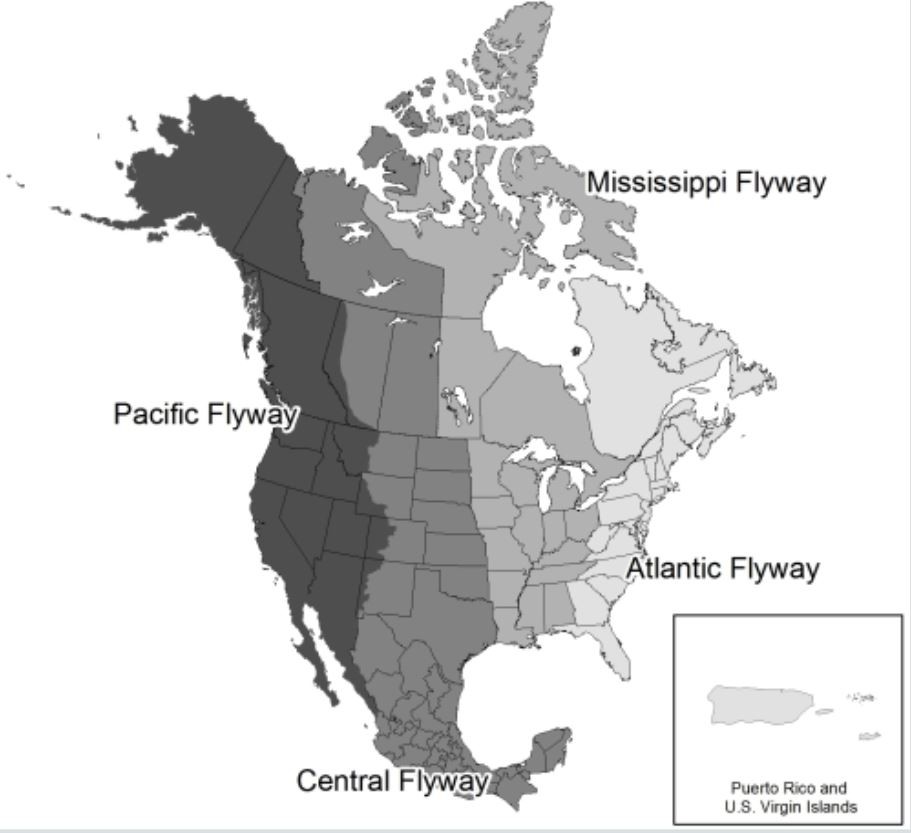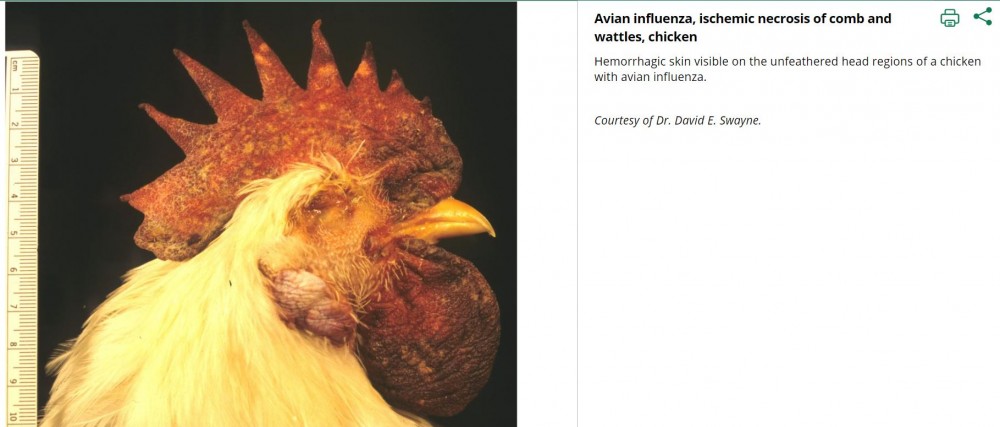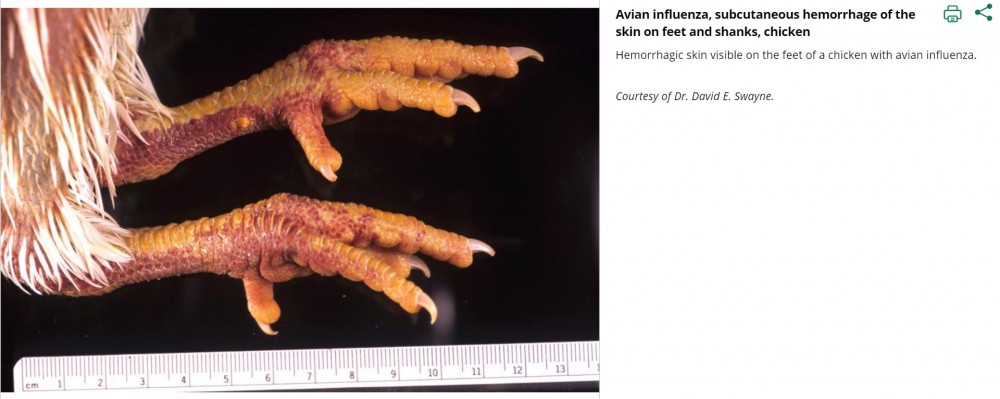Poultry Producers: Be on the Lookout for Highly Pathogenic Avian Influenza
Amy Barkley, Livestock Specialist
Southwest New York Dairy, Livestock and Field Crops Program
Nearly 140 cases of the highly pathogenic Avian Influenza strain have been identified in the U.S. in wild bird populations, but the virus can easily spread to domestic poultry. We saw this recently on February 8th, where the virus jumped into a commercial turkey flock. Keep your eye out for suddenly high mortality and/or general respiratory disease symptoms, and prepared to report any whole flock illness that looks suspicious.
What is Avian Influenza (AI)?
Avian Influenza is a highly contagious poultry virus that has the potential to cause large financial losses to the US poultry industry. A highly pathogenic strain (HPAI), H5N1, last hit the U.S. in 2014-2015, and was considered the U.S.'s largest animal health emergency. Over 200 cases of the disease were found in commercial flocks, backyard flocks, and wild birds. More than 50 million birds were affected and subsequently died or were euthanized on more than 200 farms in 15 states.
Where does it come from?
Waterfowl, both wild and domestic, act as reservoirs of infection. Since the outbreak of 2014-2015, scientists have been monitoring wild bird populations, and waterfowl hunters regularly send their harvested birds in for testing. Wild waterfowl regularly carry low-pathogenic strains of the virus, but it can easily mutate to a highly pathogenic strain, which has recently been identified in nearly 140 wild birds in Virginia, North Carolina, South Carolina, and Florida as of February 11th, 2022.
If it's only been found in wild bird populations in the South, why should I be concerned?
Wild birds follow one of four migratory routes. NYS is located in the Atlantic Flyway, which includes the states with current HPAI findings. It is anticipated that as birds migrate North in the spring that we'll begin to see the cases in wild birds move with them. It also means that there is an increased potential for the virus to establish in poultry flocks along this route.
 Wild Bird Flyway Map from the U.S. Fish and Wildlife Service. Click to enlarge.
Wild Bird Flyway Map from the U.S. Fish and Wildlife Service. Click to enlarge.
How does it spread?
HPAI lives in the respiratory and/or intestinal tract of birds. It can be picked up from contact with infected feces, surfaces, or through the air, though ariel transmission from farm to farm is unlikely. It can be transported on infected feed, clothing, or equipment. Once on the farm, the disease is readily passed from bird to bird, infecting an entire flock quickly.
Which flocks are affected?
Flocks of any size, from back yard to commercial, and any species can be affected.
Common symptoms:
Any birds can be affected, but birds other than waterfowl react most strongly to the virus. Common symptoms include:
- Sudden death without clinical signs;
- Lack of energy and appetite;
- Decreased egg production or soft-shelled or misshapen eggs;
- Swelling of head, comb, eyelid, wattles, and hocks;
- Purple discoloration of wattles, comb, and legs;
- Nasal discharge, coughing, and sneezing;
- Incoordination; or
- Diarrhea.
A high level of mortality without any clinical signs is known to be a certain sign of the virus. In some cases, expect 100% of the flock to die within a few days. Regardless of how the disease presents, a large portion of the birds in a flock will be affected. Waterfowl may carry the virus but not show symptoms.
 Necrosis/bluing of the waddles and comb in a rooster. Click to enlarge
Necrosis/bluing of the waddles and comb in a rooster. Click to enlarge Discoloration of the skin and legs of an affected chicken. Click to enlarge.
Discoloration of the skin and legs of an affected chicken. Click to enlarge.
What do I do if I think I have HPAI in my flock?
Report it! If your birds are sick or dying, it's important to report it immediately so that we can stop the spread to any other flocks. You can call:
- -Your local veterinarian or flock veterinarian
- -The State veterinarian serving your county
- -The State Animal Health Diagnostic Center, at (607) 253-3900 or poultryhealth@cornell.edu
- -The USDA tool-free at 1-866-536-7593
What can I do to manage for it?
Because there is not a vaccine currently available in the U.S. for this disease, keeping it out through biosecurity is going to be the best course of action. The easy-to-follow biosecurity principles below can go a long way to keeping your birds safe from disease:
· Establishing an "all-in, all-out" flock-management policy;
· Protecting against exposure to wild birds or water or ground contaminated by wild birds;
· Closing bird areas to nonessential personnel or vehicles;
· Providing employees with clean clothing and disinfection facilities and directions for their use;
· Thoroughly cleaning and disinfecting equipment and vehicles (including tires and undercarriage) when entering or leaving the farm;
· Banning the borrowing or lending of equipment or vehicles;
· Banning visits to other poultry farms, exhibitions, fairs, and sales or swap meets (if visits must occur, direct workers to change footwear and clothing on their return); and
· Banning bringing birds in slaughter channels back to the farm.
Other biosecurity measures can be found on the US Department of Agriculture's Animal Plant Health Inspection Service (USDA-APHIS) website. There is not a vaccine currently available in the U.S. for this disease.
If you have any questions about this disease, please contact Amy Barkley at (716) 640-0844 or amb544@cornell.edu.
Information for this article was gathered in part from the resources below.
Avian Influenza: https://www.aphis.usda.gov/aph...
The 2014 - 2015 HPAI Outbreak - https://www.aphis.usda.gov/aphis/ourfocus/animalhealth/animal-disease-information/avian/2014-2015-hpai-outbreak
2022 Highly Pathogenic Avian Influenza - https://www.aphis.usda.gov/aphis/ourfocus/animalhealth/animal-disease-information/avian/avian-influenza/2022-hpai
HPAI in Poultry: What to Expect if you Suspect- https://www.aphis.usda.gov/publications/animal_health/2015/fs-hpai-what-to-expect-if-you-suspect.pdf
Defend the Flock - Biosecurity 101 - https://www.aphis.usda.gov/aphis/ourfocus/animalhealth/animal-disease-information/avian/defend-the-flock-program/dtf-biosecurity
HPAI and Vaccine Use - https://www.aphis.usda.gov/publications/animal_health/2015/fs-hpai-vaccine-use.pdf
https://www.aphis.usda.gov/aph...
Upcoming Events
WEBINAR - Automated Milking Systems Efficiency: Balancing Focus on Individual Cows and System Optimization
May 8, 2024
Please join Cornell the SWNY team and MSU Extension for our talk with Dr. Pablo Silva Boloña on improving efficiency of Automated milking systems by focusing on milking settings for individual and group success.
Broiler Field Day at Sunny Cove Farm
June 6, 2024
Alfred Station, NY
Join us for a field day to explore broiler production, processing, and finances. Meghan Snyder of Sunny Cove Farm will be our host. She raises small batches of organic broilers, processing them on-farm under the 1,000 bird exemption.
Stockmanship and Stewardship 2024
October 25, 2024
Hamburg, NY
Save the date!! The event is one of 4 across the US and is a two-day educational experience featuring low-stress cattle handling demonstrations, Beef Quality Assurance educational sessions, facility design sessions, and industry updates.
Announcements
No announcements at this time.





